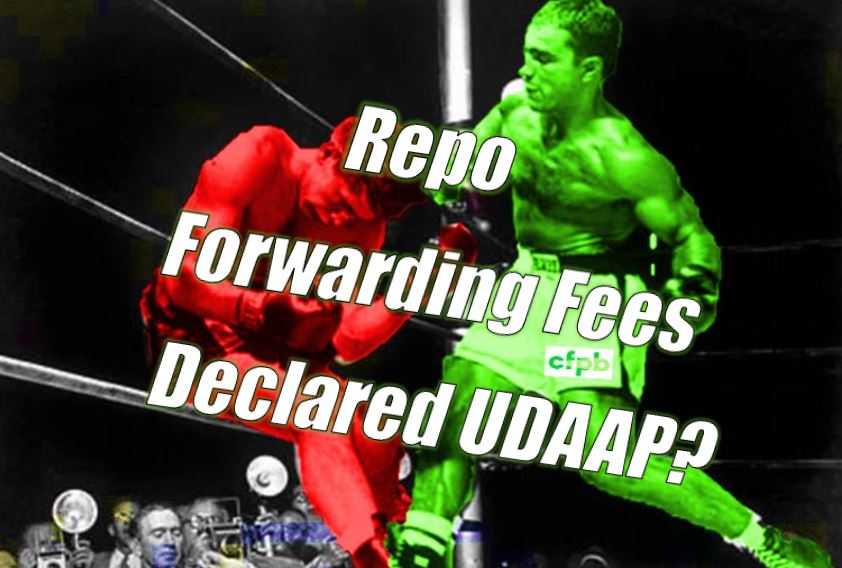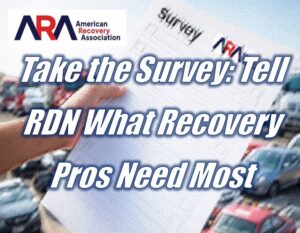“Examiners found that the servicers engaged in unfair acts or practices when they charged estimated repossession fees that were significantly higher than the costs they purported to cover.”
On March 8th, the Consumer Financial Protection Bureau released their Winter 2023 Supervisory Highlights Junk Fees Special Edition. Going far beyond the junk fees topic, were their findings that lenders charging borrowers $1,000 for a repossession fee that costs $350 on average caused or was “likely to cause substantial injury in the form of concrete monetary harm.” They even go as far as stating that the examiners found that “estimated repossession fees” charged for repossession forwarding were identified as UDAAP’s.
I wrote about this topic specifically back in July of 2022. In the editorial titled “CFPB; How is this not an UDAAP?”, I more or less called them out on this topic. While I really don’t expect the CFPB to give a squirt about the repossession industry itself, I have expected them to look out for the consumer when it comes to charging them fees for services that were not provided or for the expensing the borrower for the lenders outsourced servicing expense. After all of these years, it looks like they may finally crack down on it.
While the exam pays special focus on junk fees, I first found the title is almost a misnomer due to their biggest exam finding coming from their examinations of Loan Servicing. But on second thought, the $350 that an agency gets paid for a repossession is a bit of a “junk fee” after all. While the report covers a broad range of unfair NSF and late fees issues as the title suggests, it was in the “Auto Servicing” section 2.2., where they may have just changed the way that repossession forwarding is looked at by the lending world as a whole, as well as the class ation attorneys.
Read The Entire Report Here!
2.2 Auto Servicing
During auto servicing examinations, examiners identified UDAAPs related to junk fees, such as unauthorized late fees and estimated repossession fees. Additionally, examiners found that servicers charged unfair and abusive payment fees.
2.2.3 Charging estimated repossession fees significantly higher than average repossession costs
Examiners found that, where servicers allowed consumers to recover their vehicles after repossession by paying off the loan balance or past due amounts, servicers charged a $1,000 estimated repossession fee as part of the amount owed. This estimated repossession fee was significantly higher than the average repossession cost, which is generally around $350. By policy, the servicers returned the excess amounts to the consumer after they received the invoice for the actual cost from the repossession agent.
Examiners found that the servicers engaged in unfair acts or practices when they charged estimated repossession fees that were significantly higher than the costs they purported to cover. The relevant contracts permitted the servicers to charge consumers default-related fees based on actual cost, but here the fees significantly exceeded the actual cost. Charging the fees caused or was likely to cause substantial injury in the form of concrete monetary harm.
For consumers who paid the amount demanded, deprivation of these funds for even a short period constituted substantial injury. Furthermore, some consumers may have been dissuaded from recovering their vehicles because the servicers represented that consumers must pay a $1,000 estimated repossession fee in addition to other amounts due. Some consumers may have been able to afford a $350 fee but not a $1,000 fee, and therefore did not pay and permanently lost access to their vehicles.
Consumers could not reasonably avoid the injury because they did not control the servicers’ practice of charging unauthorized estimated repossession fees. And the injury was not outweighed by countervailing benefits to consumers or competition because the fee exceeded costs necessary to cover repossession.
In response to these findings, the servicers ceased the practice of charging estimated repossession fees that were significantly higher than the actual average amount and provided refunds to affected consumers.
Game Changer?
I am not an attorney and I am not dispensing legal advice. The below statements are based upon my understanding of the CFPB provided material. If you are looking for legal advice, call your lawyer and get a proper legal opinion.
It’s a little astounding that it has taken the CFPB over ten years to see the problem with a borrower being charged $1,000 for a repossession fee that the agent is only getting paid $350 for. Better late than never, sure, but that doesn’t really put more money in the agents pocket, it simply highlights a repossession forwarding process that has become too big, too deceptive and too damaging to the public to ignore.
Perhaps the most interesting part of this exam finding is the last line; “In response to these findings, the servicers ceased the practice of charging estimated repossession fees that were significantly higher than the actual average amount and provided refunds to affected consumers.”
As startling, was the statement “By policy, the servicers returned the excess amounts to the consumer after they received the invoice for the actual cost from the repossession agent.” Since when was this policy in place, I’d like to know? They can’t possibly be addressing the exampled $650 variance between a forwarder fee and the fee the agent gets paid. I call BS on their response to the examiners and hope they hold their feet to the fire on that statement.
For anyone desiring to argue that the quote “estimated repossession fee” means that all of this is related solely to estimates of repossession fees used in legally required notices of intent to liquidate collateral (NOI’s) that were not at the time of the servicers mailing available, I simply refer to the fact that the CFPB was speaking specifically about the huge variance between quoted $1,000 repossession fees charged to the borrower and the stated $350 fees paid to the agency. This appears to have nothing to do with an estimate as much as the actual expense to recover versus what the borrower is charged.
Are they speaking of the forwarder as the repossession agent or specifically of the repossession agency? That’s a pretty big difference and I would certainly like to think that they are intelligent enough to see the clear difference between the two. I would assume by their recognition that the actual repossession fee averages $350 that they clearly understand that forwarders are outsourced repossession management companies and not the people who actually perform repossessions.
Coming Unwound
The statement “In response to these findings, the servicers ceased the practice of charging estimated repossession fees that were significantly higher than the actual average amount and provided refunds to affected consumers.” Opens a Pandora’s Box of liability and recourse from affected borrowers going back for many years.
Repossession forwarding first exploded onto the auto servicing scene over twenty years ago. Have they, the lender examined, been refunding this difference all along? I seriously doubt it. If by admitting that it was wrong now, aren’t they confessing that they had been wrong in the past and in doing so, admitting to an uncompensated affected class of borrowers going back over two decades?
If so, this could be the genesis of a frightening number of class action lawsuits in the future. Lawsuits that could affect every finance company bank or credit union large or small engaged with the repossession forwarding process, past and present.
Does this mean that they are now absorbing everything above the actual fees paid to the repossession agency? That’s exactly what it sounds like. If so, the cost effectiveness of repossession forwarding may have just gone out the window.
Just as impactful was their statement that these fees may have hindered the consumers ability to reinstate or redeem their vehicles after repossession. Those affected, or claiming to have been affected by these fees could hypothetically demand repayment of previously made payments, damages and removal of negative marks to their credit reports.
Who was this lender or were there more than one? Who knows, but either way, it would seem to me that, at very least, every major lender under CFPB examination would feel compelled to follow suit. Even those not under CFPB examination could find their repossession forwarding practices under scrutiny by other banking and credit union examiners who may finally come to recognize the harmful and deceptive practice that this has been to the public.
Now, for all of those lenders who have been using repossession forwarding companies directly or through their CPI carrier, they may want to discuss these findings with their lawyer. They might find they have some areas of risk stemming from these practices. NOI’s are touchy documents and can cost millions when errors are found.
Is it an UDAAP?
I am not a lawyer. This is not legal advice. This is just my observation and opinion. An opinion that needs to be measured by legal definitions and standards. Standards that the CFPB has already laid out.
According to the CFPB; The standard for unfairness in the Dodd-Frank Act is that an act or practice is unfair when:
- The act or practice must cause or be likely to cause substantial injury to consumers.
Substantial injury could be argued as charging consumers for goods and services that the participating vendor (repo agency) did not receive compensation. Hidden fees in the form of forwarding fees disguised as repossession fees in the legal notices.
Arguable, but probable in my humble opinion.
- Consumers must not be reasonably able to avoid the injury
Clearly consumers have no way of avoiding this aside from keeping their loan current and avoiding the repossession altogether. Likewise, how could they avoid what they are unaware of and was not disclosed to them.
Slam dunk. Check.
- The injury must not be outweighed by countervailing benefits to consumers or Competition
There is absolutely no countervailing benefit to consumers achieved by letting forwarders jack up the price of the service.
Many lenders still manage their own repossessions. Once upon a time, all lenders did. But for over twenty years now, they’ve been allowed to bill the consumer for this outsourcing of services otherwise well within their capacity and have been doing so without clear disclosure. What next, fees for phone calls from outsourced collectors?
This is messy. Whether or not it fits all of the varying definitions of an UDAAP could very well become open for legal discussion by practicing attorneys if discovered by the right, or wrong people, depending upon your position in the matter.
So, is the CFPB labeling repossession forwarding fees as an UDAAP? Based upon their use of the same phrases and an legal litmus test for UDAAP that they clearly state in their findings, it certainly looks that way to me.
A Return to Direct Assignments?
As mentioned, if the lenders can only charge to consumer the actual fees for the repossession, their financial incentive to outsource repossession management may have just gone out the window. After all, why would you pay $1,000 to a repossession forwarder when you can only charge the consumer $350?
Perhaps there may come a resurgence of assigning direct to the agent and paying them exactly what a recovery costs so that they can bill the consumer for the real cost of recovery and avoiding losing that $650 for every $1,000 recovery. I have a hard time believing that every lender will be willing to absorb these expenses when they can simply assign direct to the agency and bill the consumer.
The CFPB has always favored a standardized national repossession fee. It is a little unsettling that they set the bar for the average repo fee at $350, but through a forwarder, that is pretty accurate, if not less. It would be hoped that they could recognize that this fee cannot stay that low and that it was artificially maintained at this low and unsustainable amount as the result of the forwarders keeping their expenses down on the back of the repossession industry.
Now, will the CFPB have issues when the repossession costs $350 and the dolly fees cost $75 and there is $10 a day storage? Hard to say, but these are at least honest expenses. Unlike the closing fees forwarders charge that get paid to no one except themselves or the vehicle storage fees they charge the consumers. The very fees that they charge but refuse to actually pay the agencies where the vehicle was stored.
I suppose it makes sense that the CFPB is taking aim at the repossession industry now. Delinquency is on the rise and few doubt that we will see massive increases in delinquency in the coming months. This is a good time for everyone to get their legal acts together. How this affects the lending industries future practices is yet to be seen, but I would be surprised if we don’t see a lot of lenders rethinking their dependece on repossession forwarders.
Am I reading too much into this? Perhaps, but I would not be surprised if we didn’t see some major changes in the repossession forwarding model or even its dominance as the primary method for assignments in the near future. This could very well be the biggest development in the repossession industry has seen in decades. Time will tell.
If anyone has a different take on this, lender, forwarder, attorney or CFPB, I would love to hear it. Please reach out to me at [email protected]
Kevin Armstrong
Editor
Source: CFPB Winter 2023 Supervisory Highlights Junk Fees Special Edition
Related Stories:
Follow up – CFPB’s Response to Questions on UDAAP Repo Fees











More Stories
Today is Fallen Agents Day – 2026
From Auction Cutting to Field Programming: The Structural Shift No One Budgeted For
Undercover ATF Pose as Repo Men to Take Down Illegal Gun Dealers
Gun Drawn on Friday the 13th Repo
National Dealer Association Responds to Senate Repossession Probe
AFSA – Setting the Repossession Records Straight